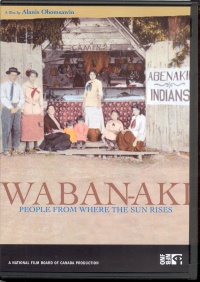| ________________
CM . . .
. Volume XIV Number 9 . . . .December 21, 2007
excerpt:
Waban-aki: People from Where the Sun Rises begins as a personal journey through the home territory and peoples of writer, director and producer Alanis Obomsawin. She weaves strands of stories and traditional crafts such as basket making, canoe building and other artistic endeavours as the film explores contemporary issues facing the Abenaki people on both sides of the 49th parallel. The issue of Native status is Obomsawin's primary political focus as she gathers and displays contemporary artefacts and personal memories and concerns from Odanak and its tribal neighbours. There is a great deal of information given in the interviews and stories about the status of First Nations people, their valiant and ongoing attempts to wrestle control over the definition of First Nations people from the federal government and their struggle to keep their culture, home and language alive. Obomsawin follows the passing of Bill C-31 and its repercussions today in the "numbering" of generations of Indians who can or cannot have status. For example, a child with one status parent will not have children who will be considered eligible for status, resulting perhaps in future generations who are no longer considered status Indians by the government and will not be able to inherit land or other tangibles from their ancestors. The documentary is filled with sensations of touch, taste and smell as the viewer watches the basket makers, the collecting of birch bark for canoes and the expressive faces of elders reminisce over past experiences. But this is not just a journey through the past, although told in a gentle nostalgic tone and including historical photographs as well as breathtaking visuals of the landscape; it includes visits to numerous contemporary small museums where the history and culture of the people are being collected and displayed to educate the next generation, both Waban-aki and non-Native. There is a strong emphasis on the importance of children and their education about the past, present and future that permeates the film, and it is easy to see through the emphasis on the stories and the traditional craftsmanship that Obomsawin feels that these are important elements of that education. Awarded Best Documentary Award, 2006, Imagine Native Media Arts Festival, Toronto. Recommended. Gail de Vos, an adjunct professor at the School of Library and Information Studies, University of Alberta, Edmonton, teaches classes on Canadian children's literature, young adult literature and storytelling.
To comment
on this title or this review, send mail to cm@umanitoba.ca.
Copyright © the Manitoba Library Association. Reproduction for personal
use is permitted only if this copyright notice is maintained. Any
other reproduction is prohibited without permission.
NEXT REVIEW |
TABLE OF CONTENTS FOR THIS ISSUE
- December 21, 2007.
AUTHORS |
TITLES |
MEDIA REVIEWS |
PROFILES |
BACK ISSUES |
SEARCH |
CMARCHIVE |
HOME |
